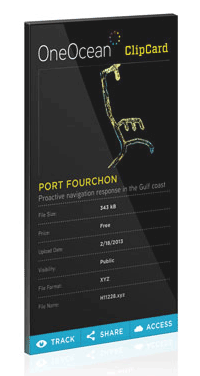
Taming the Ocean (literally) of Big Data
The ocean covers approximately 139 million square miles (or 361 million square kilometers) of the Earth’s surface. That’s approximately 70% of the total surface area of the Earth, and it represents an enormous opportunity (and challenge) for data collection.
 Startup, OneOcean Corporation, intends on being the tugboat of the ocean’s big data, aiming to tame the data waves and bring the cargo into port. Bad ocean data metaphors aside, taming ocean data is a whale of a problem that if solved can provide some significant benefits to the consumers of the insights.
Startup, OneOcean Corporation, intends on being the tugboat of the ocean’s big data, aiming to tame the data waves and bring the cargo into port. Bad ocean data metaphors aside, taming ocean data is a whale of a problem that if solved can provide some significant benefits to the consumers of the insights.
To start with, OneOcean says that a single ocean survey can come in one of over 100 file formats, reach many terabytes in size, and take a week to download. The company says that much of this data ends up locked away on hard drives and behind firewalls, is used once, and then forgotten, lost in the realm of dark data.
OneOcean intends to change the game in ocean data with their ClipCard technology platform – a cloud service in which data is uploaded to the cloud and a ClipCard (essentially a mobile window into this data) is linked to it, giving the end users the ability to manage, access, and exchange the data. The data can then be used in many ways – for instance, a shipping company can track ocean currents, temperatures, and the marine traffic flow to cut costs that could potentially amount to millions of dollars.
OneOcean references a case study noting how proactive data management is critical to aiding post-hurricane responses on the Gulf Coast. Port Fourchon, Louisiana is known as the “Gulf’s Energy Connection,” which serves 90% of all deep-water oilrigs and platforms in the Gulf of Mexico. This important port for the nation’s maritime economy contributes approximately $1 trillion to the national economy and employs over 13 million workers.
During a hurricane, response teams end up collecting a massive amount of data, with collection happening from several disparate agencies, including the U.S. Coast Guard, the port authority, the state pilot associate, and the U.S. Army Corps of Engineers.
OneOcean claims that their platform provides a central resource for these different groups to store, manage, and share the data, reducing the exchange barriers, producing useful metadata, and increasing the speed in which data can be processed and turned into useful information for the agencies.
The company’s technology is currently in beta, and being tested as a service on Amazon Web Services. The company says that their service will be available globally, providing multiple options for transferring source data on every continent.
Related Items:
Collecting Big Data in Big Oceans
Edinburgh Scientists Launch Crowdfunding for Robots that Repair Coral Reefs
Liquid Robotics Uses HPC for Ocean Exploration































